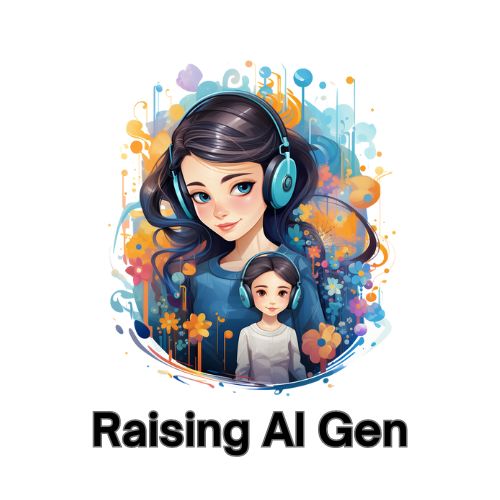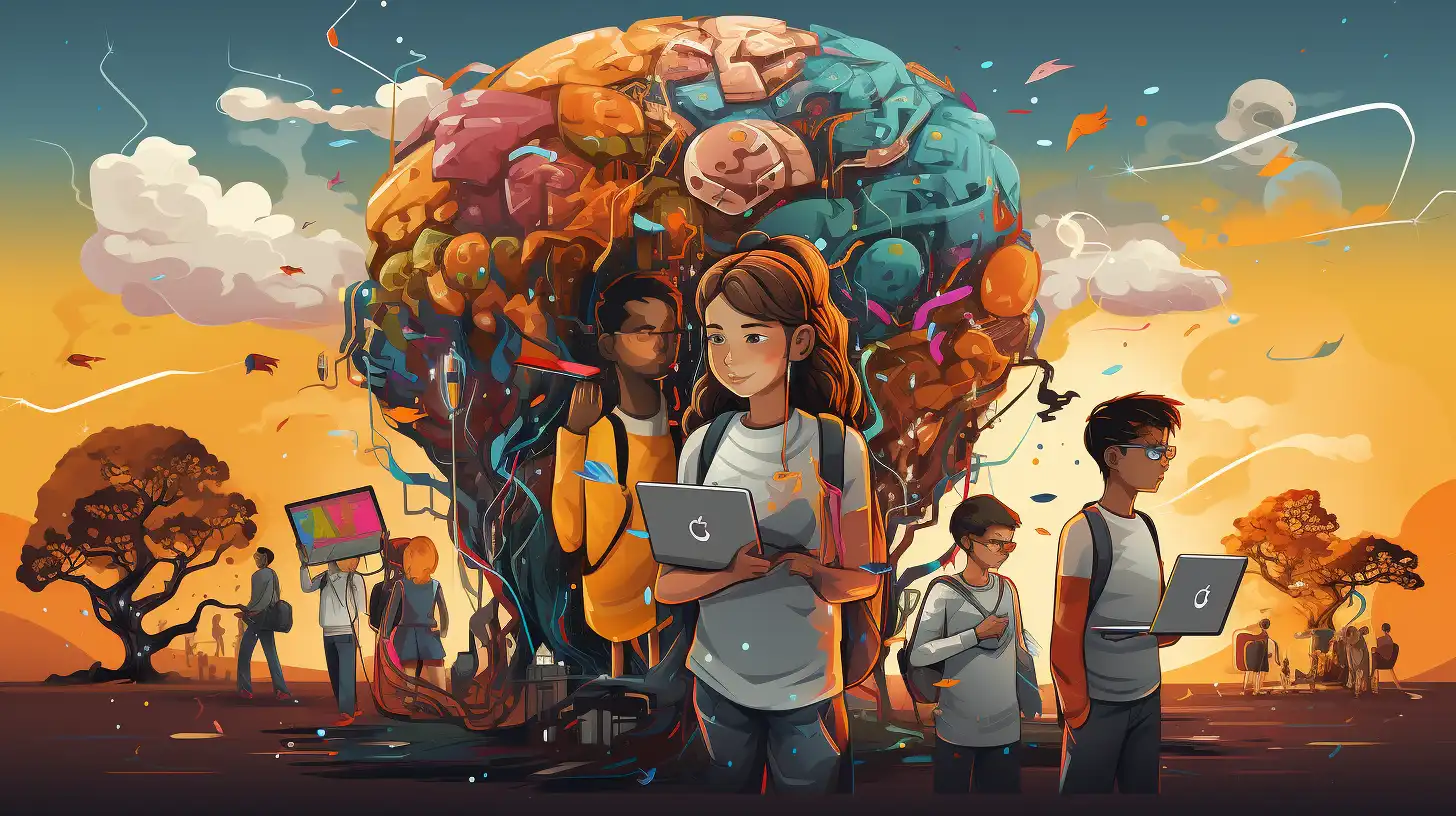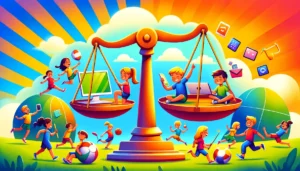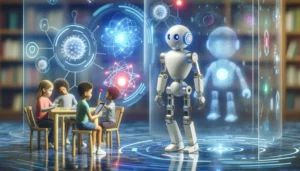Engaging in fun and educational AI activities is not just about keeping up with technological trends; it’s about unlocking a world of creativity and innovation.
Artificial Intelligence (AI), once a concept found only in science fiction, is now a fundamental part of our daily lives.
For those embarking on their AI journey, understanding its basics can be both thrilling and enlightening. This article aims to demystify AI and introduce a range of enjoyable and educational activities that cater to various age groups and learning styles.
Key Takeaways
- Understanding AI’s Basics: Grasping the core concepts of AI and how they apply to everyday scenarios.
- Age-Appropriate AI Activities: Discovering activities tailored for different age groups, ensuring learning is fun and age-appropriate.
- AI in Creativity and Education: Exploring how AI can enhance creativity and learning experiences.
- Preparing for an AI-Driven Future: Gaining insights into the future prospects of AI in education and beyond.
By the end of this article, readers will have a clear understanding of how engaging with AI activities can be both enjoyable and beneficial in our increasingly digital world.
Understanding AI and Its Role in Education
Artificial Intelligence (AI) is more than just a buzzword; it’s a transformative technology reshaping how we learn, work, and play. For beginners, understanding AI can seem daunting, but it’s all about the basics.
Let’s break it down in a way that’s easy to grasp and shows why AI is becoming an indispensable part of education.
What is AI?
At its core, AI is about creating machines or software that can perform tasks which typically require human intelligence. This includes things like:
- Problem-solving: Figuring out solutions to complex issues.
- Learning: The ability to improve and adapt over time.
- Perception: Recognizing and interpreting sensory data.
- Language Understanding: Communicating and understanding human languages.
AI in Education: A Game-Changer
AI in education goes beyond just teaching about technology. It’s an innovative tool that enhances the learning experience in various ways:
- Personalized Learning: AI systems can analyze a student’s performance and tailor the educational content to suit their individual needs.
- Efficient Assessment: AI can automate grading, giving teachers more time to focus on student interaction and personalized teaching.
- Interactive Learning Environments: Through AI, educational software becomes more engaging and interactive, aiding in better retention of knowledge.
The Benefits of AI in Education
- Enhanced Engagement: AI-driven tools make learning more interactive and fun.
- Personalized Pace and Style: Students can learn at their own pace, in a way that suits their learning style.
- Accessibility: AI tools can provide learning opportunities for students with different needs and abilities.
The Future of AI in Education
As we look ahead, AI’s role in education will only grow. It’s set to revolutionize how we teach and learn, making education more accessible, personalized, and effective.
- AI Tutors: Personal AI tutors for students, providing 24/7 assistance and support.
- Data-Driven Insights: Using AI to analyze educational trends and improve teaching methods.
- Global Classroom: AI breaking down geographical barriers, connecting students and teachers worldwide.
Top Fun AI Activities for Different Age Groups
AI isn’t just for tech experts and scientists; it’s for everyone!
From kids to adults, AI activities can be tailored to be both fun and educational. Let’s explore some of the most engaging AI activities suitable for different age groups.
AI Activities for Young Children
Young minds are naturally curious and creative, making them perfect candidates for introductory AI activities.
Here are some ideas:
- AI Storytellers: Interactive apps that use AI to create personalized stories.
- Simple Coding Games: Introduce basic programming concepts through fun, AI-powered games.
- AI-Powered Educational Toys: Toys that learn and adapt to a child’s play style.
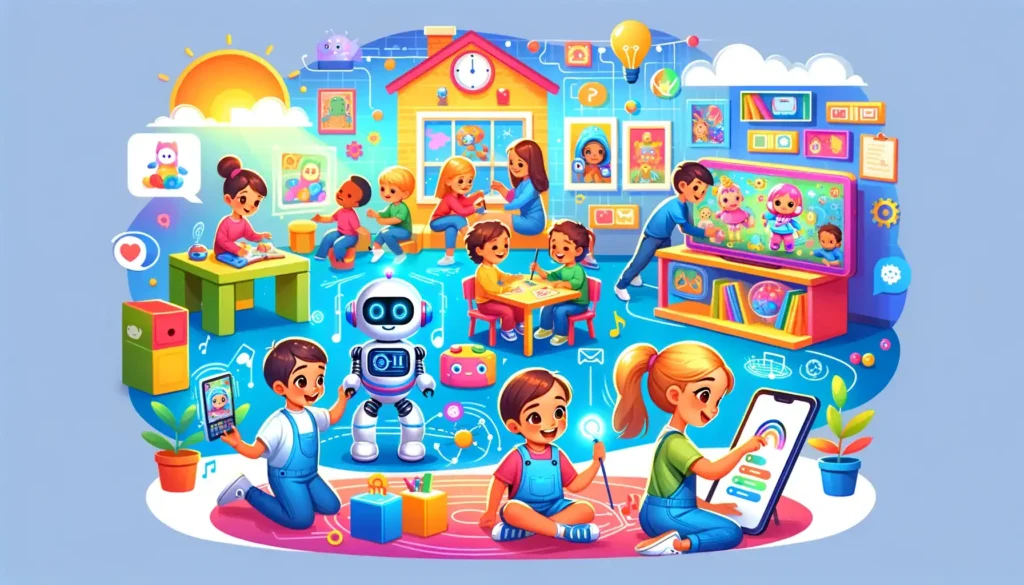
AI Activities for Teenagers
As children grow into teenagers, they can handle more complex AI concepts and activities:
- Building Basic Chatbots: A fun way to learn about AI and natural language processing.
- AI in Video Games: Understanding how AI is used in their favorite games.
- Participating in Online AI Courses: Many platforms offer introductory courses on AI and machine learning.
AI Activities for College Students
For those in college, AI activities can be more sophisticated, involving real-world applications:
- AI Research Projects: Engaging in simple AI research or development projects.
- Advanced AI Tools and Software: Experimenting with AI software that’s used in industry.
- AI Competitions and Hackathons: Participating in events that challenge their AI skills.
Why These Activities Matter
- Fosters Creativity and Critical Thinking: Engaging with AI helps develop important skills.
- Prepares for the Future: Understanding AI is crucial in a world where technology is ever-evolving.
- Builds a Foundation for Advanced Learning: Early exposure to AI paves the way for more complex learning in the future.
Interactive AI Tools and Apps for Learning
In today’s digital age, learning is not confined to textbooks and classrooms. Artificial Intelligence (AI) has brought about a revolution in educational tools and apps, making learning more interactive, engaging, and tailored to individual needs.
Let’s explore some interactive AI tools and apps that are shaping the future of education.
AI Tools for Enhanced Learning
AI tools are redefining the educational landscape by providing personalized learning experiences.
Here are some notable tools:
- AI Tutors: These are AI-powered applications that provide personalized tutoring, helping students understand complex topics at their own pace.
- Language Learning Apps: Utilizing AI to offer customized language learning experiences based on the learner’s level and progress.
- Homework Helpers: AI apps that assist students in solving math problems, writing essays, and more.
Benefits of Using AI in Education
The integration of AI in educational tools offers numerous advantages:
- Personalized Learning Pathways: AI adapts to each student’s learning style, pace, and preferences.
- Instant Feedback and Support: Provides immediate feedback, enhancing the learning process.
- Accessibility: Makes education more accessible, especially for those with special needs.
How AI Tools Make Learning More Engaging
- Interactive Content: AI tools often include interactive elements like games and simulations that make learning fun.
- Real-Time Adaptation: These tools adapt in real-time to a student’s responses, keeping them challenged and engaged.
- Visual and Auditory Learning Aids: AI tools use visual and auditory aids to cater to different learning styles.
AI Tools for Mental Health and Well-being
AI is not just about academic learning; it also extends to mental health and well-being:
- AI Chatbots for Mental Health: These chatbots provide support and guidance on mental health issues.
- Stress Management Apps: AI-driven apps that help students manage stress and anxiety.
AI and Creativity: How AI Can Boost Creative Thinking
Artificial Intelligence (AI) is not just a scientific or mathematical field; it’s a vibrant tool that can enhance creativity and artistic expression. From music composition to visual arts, AI is opening up new avenues for creative minds.
Let’s explore how AI is blending with creativity to inspire innovation.
AI in the World of Art and Design
AI is revolutionizing the creative industry in various ways:
- AI-Generated Art: Using algorithms to create unique paintings, drawings, and sculptures.
- Design Assistance: AI tools that help designers in ideation, layout, and color selection.
- Music Composition: AI software can compose music, providing a new tool for musicians and composers.
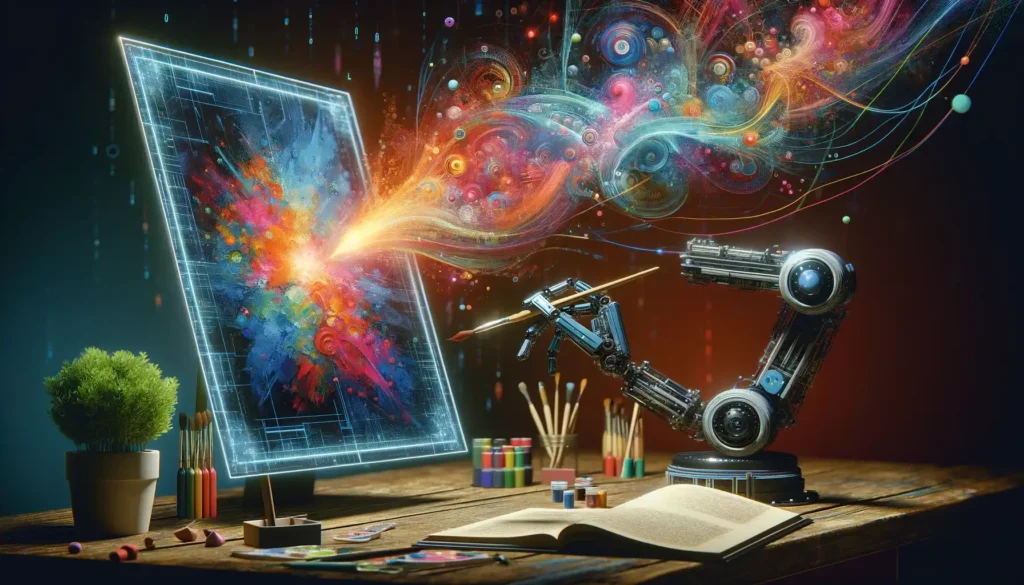
The Role of AI in Creative Writing
AI is not just about visual arts; it extends its reach into writing as well:
- Story Generation: AI can help generate story ideas, plot lines, and even write drafts.
- Language Enhancement Tools: AI-powered tools that assist in editing and refining written content.
- Poetry and Songwriting: AI algorithms can craft poetic verses and song lyrics, offering a fresh perspective.
Enhancing Creativity through AI
AI stimulates creativity by:
- Offering New Perspectives: AI can suggest ideas that may not occur to the human mind.
- Removing Creative Blocks: AI tools can help overcome moments of creative stagnation.
- Experimentation and Learning: AI enables artists to experiment with styles and techniques they might not be familiar with.
AI in Educational Creativity
In educational settings, AI is being used to encourage creative thinking:
- Project-Based Learning: AI tools that assist in creative projects and research.
- Interactive Learning Tools: Software that makes learning subjects like history and science more engaging through interactive storytelling and simulations.
The Role of AI in Personalized Learning
Personalized learning, tailored to each individual’s needs, strengths, and interests, is rapidly becoming the cornerstone of modern education, and Artificial Intelligence (AI) is playing a pivotal role in this transformation.
AI’s ability to adapt to each student’s learning style is revolutionizing the educational experience. Let’s delve into how AI contributes to personalized learning and why it’s so important.
Tailoring Education to Individual Needs
AI’s impact on personalized learning is significant, offering diverse benefits:
- Adaptive Learning Programs: AI systems assess a student’s performance and adjust the difficulty level and learning style accordingly.
- Customized Learning Resources: AI curates learning material based on individual preferences and understanding levels.
- Feedback and Progress Tracking: Continuous feedback and progress tracking help students and educators identify areas for improvement.
Advantages of AI in Personalized Education
Utilizing AI for personalized learning offers several advantages:
- Enhanced Engagement: Students are more engaged when learning material resonates with their interests and learning style.
- Efficient Learning: Tailored content means students spend time learning what they need, enhancing efficiency.
- Improved Outcomes: Personalized learning paths can lead to better understanding and retention of information.
AI-Powered Tools in Personalized Learning
Several AI-powered tools are making strides in personalized education:
- Language Learning Apps: Apps like Duolingo use AI to offer personalized language learning experiences.
- Mathematics Tutors: AI tutors provide customized assistance in mathematics, adapting to the learner’s pace.
- Reading Assistance Tools: These tools help in improving reading skills by adapting to each student’s reading level.
Challenges and Considerations
While AI in personalized learning offers many benefits, there are challenges to consider:
- Privacy and Data Security: Ensuring student data used by AI systems is protected and secure.
- Equitable Access: Providing equal access to AI tools for students from various backgrounds.
- Balancing Human and AI Interaction: Maintaining a balance between AI-driven learning and human interaction is crucial.
Learn More about AI Personalized Learning
Hands-On AI Projects for Practical Learning
Diving into hands-on projects is one of the most effective ways to understand and appreciate the power of Artificial Intelligence (AI). Practical AI projects not only reinforce theoretical knowledge but also provide invaluable experience in solving real-world problems.
Whether you’re a beginner or have some experience, there are AI projects suitable for every level.
Starting with Simple AI Projects
For those new to AI, starting with simple projects can build confidence and foundational skills:
- Creating a Basic Chatbot: Learn the basics of AI by building a simple chatbot that can answer predefined questions.
- Image Classification with AI: Use pre-built AI models to classify and identify objects in images.
- AI-Powered Games: Develop simple games using AI, such as a tic-tac-toe game with an AI opponent.
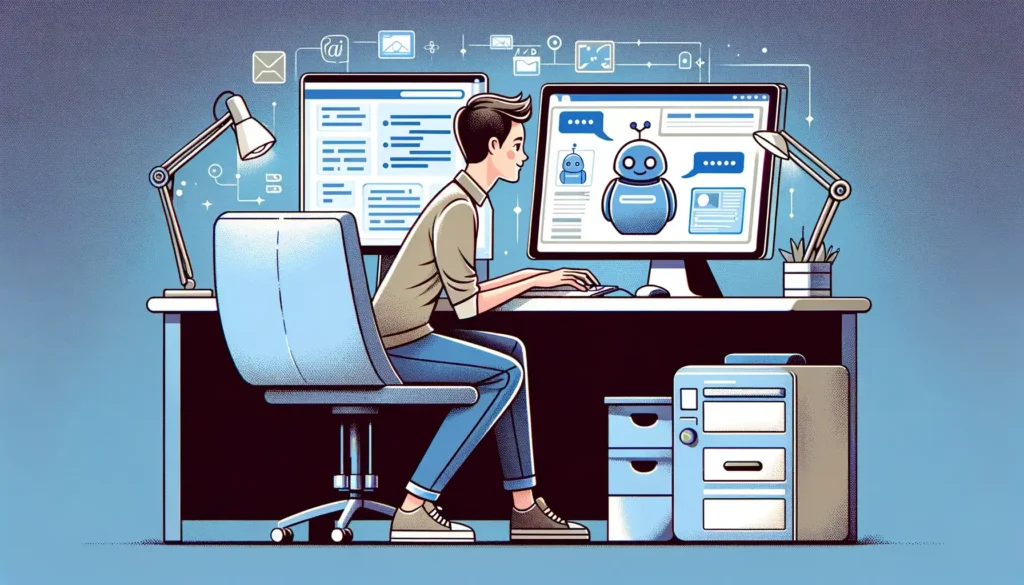
Intermediate AI Projects
Once the basics are mastered, you can move on to more complex projects:
- Voice Recognition Systems: Create a system that recognizes and responds to spoken commands.
- Sentiment Analysis: Use AI to analyze text data and determine the sentiment behind it.
- Predictive Analysis: Work on projects that use AI to predict outcomes based on data, like weather forecasting.
Resources for Undertaking AI Projects
- Online Tutorials and Courses: There are numerous online resources available to guide you through your AI project journey.
- AI Development Tools: Utilize tools like TensorFlow or PyTorch for more advanced projects.
- Community and Forums: Engage with online AI communities for support, advice, and collaboration.
Why Hands-On Experience is Crucial
- Real-World Application: Applying AI in real-world scenarios enhances understanding and retention.
- Problem-Solving Skills: Tackling challenges in projects develops critical thinking and problem-solving abilities.
- Portfolio Building: Completing projects adds valuable experience to your portfolio, essential for future opportunities in AI.
Discover More about AI Smart Home Applications
The Future of AI in Education
As we venture deeper into the 21st century, the role of Artificial Intelligence (AI) in education continues to expand, offering exciting prospects and transformative changes. AI is not just a fleeting trend in education; it’s shaping up to be a fundamental element that could redefine teaching and learning processes.
Let’s explore what the future might hold for AI in the realm of education.
Predicting the Trends in AI and Education
The future of AI in education is brimming with possibilities:
- Customized and Adaptive Learning: AI will continue to advance personalized learning, making education more adaptive to individual student needs.
- Automated Administrative Tasks: AI could take over more administrative tasks, giving educators more time to focus on teaching.
- Enhanced Accessibility: AI technologies will make education more accessible to students with diverse needs and learning styles.
Preparing for an AI-Driven Educational Landscape
To keep pace with these changes, here are some steps students, educators, and institutions can take:
- Stay Informed: Keep abreast of the latest AI developments and their applications in education.
- Develop AI Skills: Encourage learning AI-related skills, including programming and data analysis.
- Ethical Considerations: Understand the ethical implications of AI in education, focusing on privacy, fairness, and transparency.
The Role of Teachers in an AI-Enhanced Future
The human element remains crucial, even as AI becomes more prevalent in education:
- Mentorship and Guidance: Teachers will play a vital role in mentoring and guiding students in an AI-enhanced learning environment.
- Interpreting AI Insights: Educators will need to interpret and implement insights provided by AI tools to improve teaching strategies.
- Emotional and Social Learning: AI cannot replace the emotional and social learning that teachers facilitate.
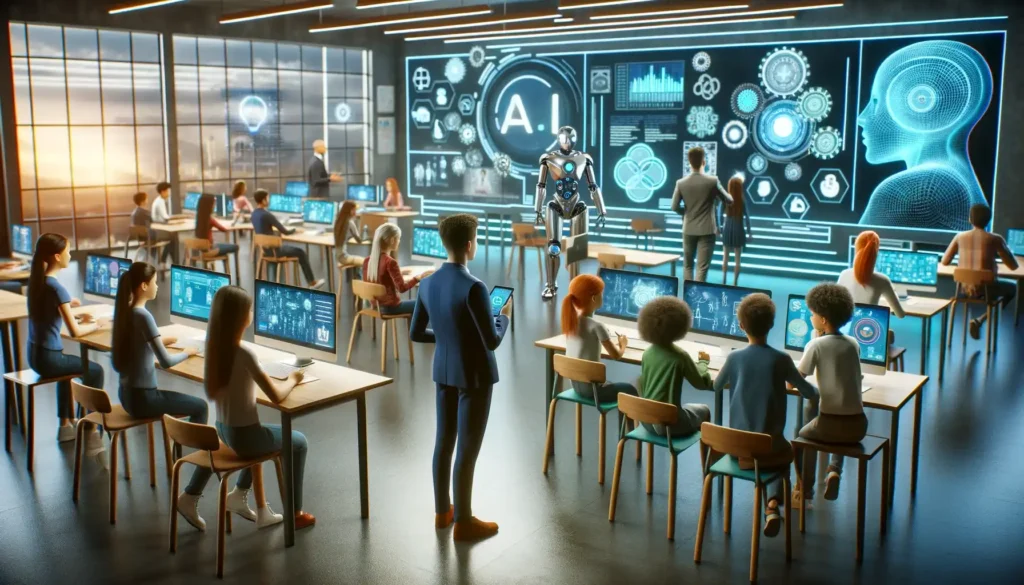
The Impact of AI on Global Education
AI has the potential to make education more accessible and equitable on a global scale:
- Breaking Down Geographical Barriers: AI can connect students and teachers across the globe, fostering a more inclusive global classroom.
- Addressing Educational Disparities: AI tools can help bridge the gap in educational resources and opportunities.
Embarking on Your AI Adventure: Next Steps and Conclusion
As we reach the end of our exploration into the fascinating world of AI and its impact on education, it’s clear that we are standing at the threshold of a new era.
AI is not just a tool for efficiency; it’s a catalyst for innovation, creativity, and personalized learning.
Harnessing the Power of AI in Learning
We’ve journeyed through the various realms where AI is making a significant impact—from enhancing creative pursuits to revolutionizing personalized education and preparing for an AI-driven future.
The potential of AI in education is boundless, and its ability to transform learning experiences is just beginning to unfold.
Your Role in the AI-Powered Future
Whether you’re a student starting your journey, an educator looking to incorporate AI into your curriculum, or simply an AI enthusiast, there’s a role for you in this evolving landscape:
- Stay Curious: Continue exploring AI technologies and their applications in education.
- Skill Development: Invest time in learning AI-related skills and understanding its ethical implications.
- Embrace Change: Be open to how AI can transform educational experiences and teaching methodologies.
Dive into the World of AI
- Explore Further: Delve deeper into AI topics and projects that pique your interest.
- Participate in Communities: Engage with online forums and communities to share insights and learn from others.
- Share Your Experiences: As you embark on your AI journey, share your experiences and learnings to inspire others.
The journey into AI is not just a path to acquiring new skills; it’s about opening doors to a world where technology and human creativity coexist in harmony. AI is shaping a future where learning is more personalized, accessible, and engaging. So, take the first step, embrace AI, and be a part of this exciting journey.
Frequently Asked Questions About AI in Education
| Question | Answer |
|---|---|
| What is AI in the context of education? | AI, or Artificial Intelligence, in education refers to the use of machine learning, data analysis, and other technological advancements to enhance learning experiences, personalize education, and automate administrative tasks. |
| How can AI benefit students? | AI benefits students by providing personalized learning paths, instant feedback, and diverse educational tools that cater to individual learning styles, thus enhancing engagement and understanding. |
| Are AI tools difficult for beginners to use? | Many AI tools are designed with user-friendliness in mind, especially those targeted at beginners. They often come with tutorials and support to help new users navigate and utilize them effectively. |
| Can AI replace teachers in the classroom? | No, AI is not meant to replace teachers. Instead, it serves as a tool to augment the educational process, assisting teachers in personalizing education, providing additional resources, and reducing administrative workload. |
| What kind of AI projects can beginners undertake? | Beginners can start with simple AI projects like creating basic chatbots, using pre-built AI models for image classification, or developing AI-powered games. |
| How does AI ensure the privacy and security of students? | AI tools in education are developed with privacy and security considerations, adhering to data protection laws and regulations. They often include features like encryption and secure data handling to protect student information. |
| Where can I find resources to learn more about AI in education? | Resources are abundant online, including educational websites, online courses, forums, and communities dedicated to AI in education. Many of these resources are tailored for different knowledge levels, from beginners to advanced learners. |
| How can educators prepare for incorporating AI in their teaching? | Educators can prepare by staying informed about the latest AI advancements in education, participating in professional development courses on AI, and experimenting with AI tools to understand their applications in teaching. |
Further Reading
For those interested in exploring more about AI in education and its various applications, here is a table of further reading materials. These articles, found on your website, delve deeper into specific aspects of AI, offering a wealth of information for both beginners and those already familiar with the field.
